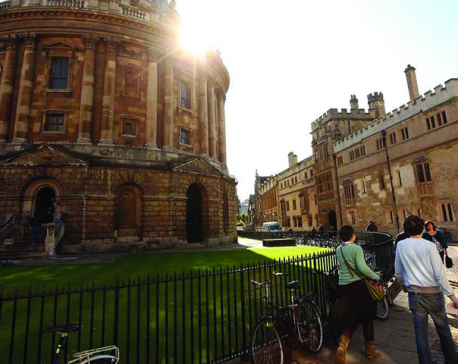
OR
Experts whet gender discourse on higher education
Published On: November 25, 2018 07:30 PM NPT
KATHMANDU, Nov 25: How supportive our school, college and university curricula to dismantle or change the society based on discriminatory practices constructed under the sex-gender system?
This question came as a refrain at a two-day workshop on 'interjection of gender discourse in higher education' that kicked off here today. The event is organized by the Tribhuvan University, Gender Studies Programme.
In her opening remarks, Prof Dr. Bindu Pokharel said high demand of the time was to minutely analyze whether social science curricula and textbooks were capable of changing the society founded on the discriminatory system; whether they reflected the status of women, marginalized and backward communities, physically challenged, gender and sexual minorities, ethnic people and those facing the social exclusions. She also recommended the ways for liberating from their 'undesirable' conditions to contribute to building a gender-just society.
Prof Pokharel underlined the need for looking into the history and so-called hardcore disciplines like economics and politics to find out how they define women and their roles. “Language of teachers inside the classrooms, teachers-students communications and teachers' behaviors towards students means a lot in the creation of teaching atmosphere which has had a great impact on the hearts and minds of the people and shaping their attitude and personality that is later reflected in the society,” she arguing, adding that it was the prime need of the hour to take all the issues seriously and make timely interventions if they were not capable of helping the society to achieve gender equality and build a gender-just society, one of the requirements of the sustainable development.
Chief guest at the programme, TU Rector, Dr. Sudha Tripathi, shared her personal experiences, “A woman said earlier, women like her who talked about rights of women, questioned unequal treatment between women and men and the submissive position of women in the society used to be stigmatized and described as 'destroyers' of social harmony. But in those days, she was not aware of feminism, but was deeply concerned about social inequality facing women due to the long-dominating patriarchal system and later utilized her literary journey as a tool to bring out her revolutionary ideas.”
As she said, situation has changed, though not completely, and injection of gender discourage in the educational curricula right from the school level was necessary to defeat the voices come and coming in favor of patriarchy through logic and reasons and to make the society aware of how this system is biased and one-sided which always celebrates the men's status and undervalues the women's existence. She took a time to term the event 'highly relevant'.
Development expert Dr. Meena Acharya described the 'women' and 'gender studies programmes' as tools of producing ideological activists to fight discriminatory practices based on sex/ gender system.
Dean of Faculty of Humanities and Social Sciences at TU, Shiva Lal Bhusal, called for reaching down to the root of patriarchy to dismantle the biased system.
Giving her presentation in the second session of the programme, Prof Dr Mira Mishra remembered those figures such as Catherine Stimpson, Virginia Wolf and Sally Slocum whose works were helpful in making women much conscious of their positions during the 1960 and thereafter when the second wave feminism was vibrant and same consciousness finally led to the establishment of Women's Studies in San Diego, the United States of America.
"Sexism which has been largely dominating the academia as well has been the main issue for feminist socialists," she said.
Presenting her paper, TU Associate Professor Pushpa Ghimire highlighted the gender gaps in the economic disciplines and degrees curricula which defined men as 'rational' 'active' and 'productive' human being and women as mere 'beneficiaries' and 'consumers' and their works in the private sphere are defined as 'unproductive chores' .
She also echoed the need for revising such curricula, introducing gender discourse in higher education and gender-sensitive teaching atmosphere.
Prof Dr. Harindar Thapaliya insisted on the need for conceptual clarity between sex and gender as sex is biological and gender is a social construct.
The event is expected to come up with guidelines and feedbacks useful for those authorities to incorporate the gender discourse in the higher education system. RSS
You May Like This

NUTA seeks recognition of central-level universities to state- owned universities
KATHMANDU, June 20: A delegation from the Nepal University Teachers' Association (NUTA) today called on Prime Minister Sher Bahadur Deuba... Read More...

What universities can do
British universities should find more ways to contribute to UK’s economy, so that it can continue to compete with... Read More...

Tanahun women lead funeral procession to end gender stereotype
TANAHUN, Nov 24: To put an end to the patriarchal thinking, women of Tanahun have taken the dead body to... Read More...




Just In
- Health ministry to conduct ‘search and vaccinate’ campaign on May 13
- Indian customs releases trucks carrying Nepali tea, halted across Kakarbhitta
- Silent period for by-election to begin from midnight
- SC issues short-term interim order to govt and TU not to take immediate action against TU legal advisor Khanal
- National consultation workshop advocates to scale up nutrition smart community in Nepal
- Patan High Court issues short-term interim order to halt selection process of NTB’s CEO
- NEPSE inches up 0.15 points; daily turnover increases to Rs 2.53 billion
- Bagmati Govt mandates tri-lingual signboards in offices














Leave A Comment